Diálogo entre Ramos Sucre y Leopardi (ficción) | Dialogue between Ramos Sucre and Leopardi (fiction)
Español
El 9 de junio de 1890 nacía en Cumaná (Venezuela) uno de los más trascendentes poetas venezolanos, que por su estilo, nada acostumbrado (el poema en prosa), marcó hito no solo en la literatura nacional sino en las de habla hispana en general, e incluso más allá, siendo traducido a otros idiomas y estudiado en cátedras de muchas universidades internacionales. Me refiero a José Antonio Ramos Sucre, quien provocara su propia muerte el 9 de junio de 1930, pero falleciera el 13 de junio.
En 1990 publiqué en la revista Trizas de Papel, del Centro de Actividades Literarias José Antonio Ramos Sucre (Casa Ramos Sucre, Cumaná), del cual era su coordinador, un diálogo apócrifo, ficcional, entre el poeta cumanés y el poeta italiano Giacomo Leopardi. Ramos Sucre advirtió la semejanza con él, diciendo en una de sus cartas: “Leopardi es mi igual”.
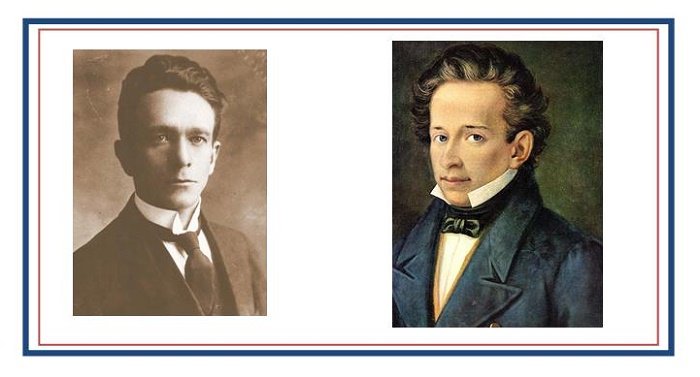
Lector de la obra de Ramos Sucre y conocedor de su vida, me dediqué a leer más sobre Leopardi (había leído parte de su poesía), sobre su vida y obra literaria. Y encontré, por circunstancias oportunas de la vida (una biblioteca de la que estaban desincorporando algunos libros), un ejemplar de sus Diálogos, en una edición de la editorial Espasa-Calpe de 1939. Emulando ese tipo textual (en el que también el escritor italiano Cesare Pavese inscribiría su extraordinario libro Diálogos con Leucó), y estableciendo las relaciones intertextuales con textos de Ramos Sucre y de Leopardi, escribí la ficción (pues ambos autores nunca podrían haberse conocido) en una especie de encuentro intemporal.
Ahora lo doy a conocer en forma digital por esta plataforma, con unos pequeños cambios con respecto a su original impreso, como un homenaje más al gran poeta que fue y es José Antonio Ramos Sucre.
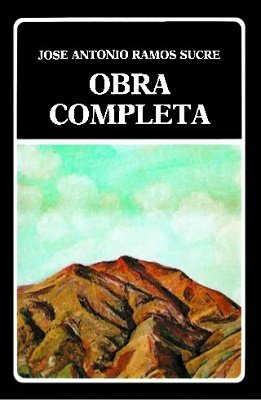
Leopardi: ¿Por qué me consideraste tu igual? ¿Acaso mi dolor fue un espejo para tu propio desgarramiento?
Ramos Sucre: Por nuestras vidas corrió la prohibición y la infelicidad, como el río tardo atravesando la ciudad. En mi infancia el encierro y la incomprensión prefiguraron mi destino. El rigor y el estudio me forjaron, y, a la vez, labraron en mí la fatalidad. ¿No fue ese tormento de tu infancia y de tu ciudad lo que te hizo decir: “…me he destruido infelizmente, sin remedio para toda la vida…” y “aquí…todo es insensatez y estupidez”? ¿Recuerdas?
Leopardi: Sí. Recanetti fue mi prisión, mi caverna. De los duros años de disciplina y pena impuestos por mis padres en mi juventud se alimentó mi melancolía. Un fardo se colgó en mis espaldas. Pero con el encierro se abrió ante mis ojos un limpio reflejo: el mundo de los antiguos. A través de su palabra confronté la esencia y profundidad de lo humano. A Safo, y a todos ellos, debo: “… Arcano es todo / menos nuestro dolor. Olvidada prole / nacimos para el llanto, y el porqué / permanece en el seno de los dioses…”.
Ramos Sucre: También en mí los antiguos dejaron su impronta. En su legado escuché mis propias voces. Me acogí a sus ecos eternos y la sobriedad de mi expresión se templó bajo su égida. Sí, el encierro, como a ti, acendró mi inteligencia y potenció mi facultad lírica. Con él se reveló la fuerza de mi incurable soledad. Fue la soledad, dulce y fatigosa semejante, la morada de mis sueños y mis dolores. Refugio y alimento brotado de la tierra calcinada de mi vida, como la retama, tu cara flor nacida de las cenizas del Vesubio.
Leopardi: La retama… es flor que emerge de la ruina, pero además es planta solitaria en el desierto inmenso, y cuya vida ha de ser necesariamente breve. Así el hombre está solo en el universo ilimitado, y la vida parece ser un diálogo con el dolor: inexorable destino.

Ramos Sucre: No obstante, la soledad puede encarnarse como una voluntad superior frente a ese destino, y fortalecer la interioridad y también alejar las vacías costumbres que esterilizan el espíritu.
Leopardi: Así lo creo. Mas la soledad es también agonía por un tiempo y un mundo no elegido, no merecido. En su asilo la sensibilidad se exacerba y purifica, se hace hilo fino y frágil, conciencia atormentada. La intensidad espiritual que informa tu ser traza igualmente tu alejamiento del mundo, tu sino de solitario. Ante la vida corriente somos extraños: “impertinente amada que me cuenta amarguras”, escribiste.
Ramos Sucre: Quise dar testimonio de un mundo abandonado al mal, y lo aprecié como una fuerza generadora de belleza, un rasgo preponderante en la memoria de la humanidad. Sin embrago, me sublevaba contra el padecimiento mío y de mis semejantes. Anhelaba escapar de la adversidad que horadaba mi espíritu y me fatigaba. La infelicidad había hendido mi vida y se alojaba como un topo en mi cuerpo.
Leopardi: La afinidad de nuestras vidas me asombra. Mi padecimiento, el que observé en mi época y el que conocí de otros tiempos a través del estudio, alentaron en mí una filosofía desesperada. En ella llegué a pensar, aunque me desgarraba al hacerlo, que la infelicidad es innata al género humano.
Ramos Sucre: Pero, ¿no es posible alcanzar la serenidad individual frente al estado de sufrimiento?
Leopardi: La serenidad siempre será un estado por venir, aun en el más recogido aislamiento. Pero la contemplación y la imaginación te permiten develar lo no visto, lo presentido, lo indefinido de la existencia y de las cosas. Y en ese sentimiento una intuición, como una mirada interior, te sostiene: lo eterno.
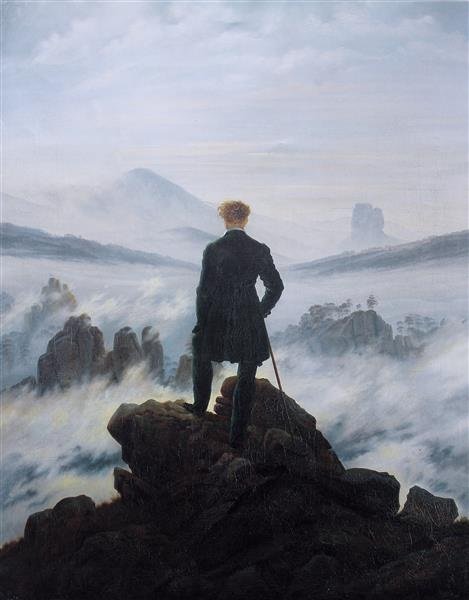
Fuente | Source - Dominio público | Public Domain
Ramos Sucre: O lo infinito, como lo llamaste y sobre lo cual escribiste: “así, en esta inmensidad, mi pensamiento se hunde / y el naufragar me es dulce en este mar”. También en mis libros compartí ese sentimiento: “…y un solaz infinito reposará mi semblante”. La búsqueda del absoluto, la presencia del misterio, visitaba mi espíritu y lo mantenía en vilo. No encontrándole respuesta en el presente, mi alma se dejaba habitar por un tiempo pasado, mítico, arquetípico, donde lo lejano actuaba como un ensueño, una trascendencia, una fuga del mundo.
Leopardi: Fue esa una de mis inquietudes vitales. ¿Cómo hacer de lo infinito una presencia actual? La respuesta la hallé en la memoria ( y su olvido) y en la imaginación. Gracias a ellas puede el alma experimentar una sensación abierta, concebir un tiempo indeterminado, pensar espacios borrosos cercanos a la inocencia y al enigma. Pero tocar esta profundidad comporta un reto a la palabra.
Ramos Sucre: Sí. La agudeza y densidad de una visión como esta supone la dificultad de su expresión. La palabra se debate entre la posibilidad o la imposibilidad de comunicar con claridad lo eterno. “Yo quise hablar y mis palabras volaron por el aire…”, recuerdo que escribí. Lo inasible y lo indecible, como la incertidumbre, son leyes del universo. Por eso la ambigüedad es la forma de restituir a lo poético su cualidad de palabra sagrada.
Leopardi: Ciertamente. Lo poético, en tanto palabra de lo sagrado, es un acercamiento a lo infinito o a su ilusión. Y por ello una interpretación de la nada. Pues el sentimiento de lo infinito conduce al sentimiento de la decadencia propia y de lo que te rodea: un sentimiento de la muerte.
Ramos Sucre: En verdad, hemos atravesado el umbral de lo absoluto y de la muerte.
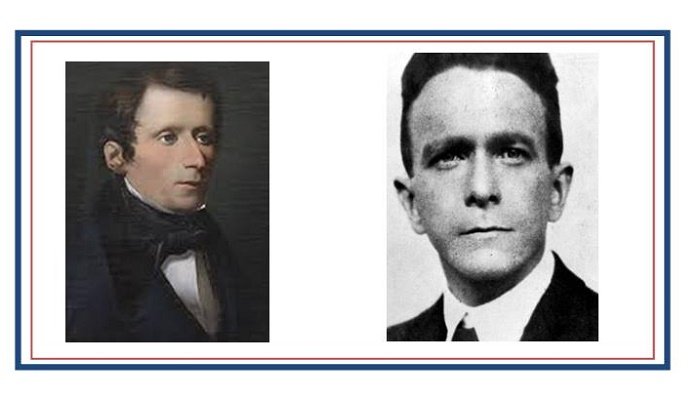
English
On June 9, 1890 was born in Cumaná (Venezuela) one of the most transcendent Venezuelan poets, who for his style, not at all usual (the prose poem), marked a milestone not only in national literature but in Spanish-speaking literature in general, and even beyond, being translated into other languages and studied in chairs of many international universities. I am referring to José Antonio Ramos Sucre, who caused his own death on June 9, 1930, but died on June 13.
In 1990 I published in the magazine Trizas de Papel, of the Centro de Actividades Literarias José Antonio Ramos Sucre (Casa Ramos Sucre, Cumaná), of which I was its coordinator, an apocryphal, fictional dialogue between the poet from Cumaná and the Italian poet Giacomo Leopardi. Ramos Sucre noticed the similarity with him, saying in one of his letters: "Leopardi is my equal".
Reader of Ramos Sucre's work and connoisseur of his life, I dedicated myself to read more about Leopardi (I had read part of his poetry), about his life and literary work. And I found, by opportune circumstances of life (a library from which they were disincorporating some books), a copy of his Dialogues, in an edition of the publishing house Espasa-Calpe of 1939. Emulating that textual type (in which also the Italian writer Cesare Pavese would inscribe his extraordinary book Dialogues with Leucó), and establishing intertextual relations with texts by Ramos Sucre and Leopardi, I wrote the fiction (since both authors could never have met) in a sort of timeless encounter.
Now I am releasing it in digital form through this platform, with some small changes with respect to its printed original, as one more tribute to the great poet who was and is José Antonio Ramos Sucre.
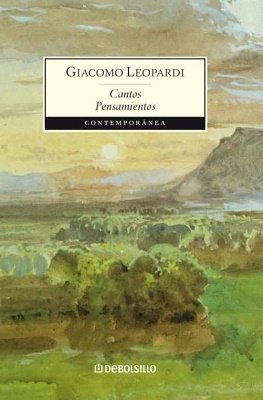
**Leopardi: Why did you consider me your equal? Was my pain a mirror for your own heartbreak?
Ramos Sucre: Through our lives ran prohibition and unhappiness, like the late river flowing through the city. In my childhood, confinement and misunderstanding foreshadowed my destiny. Rigor and study forged me, and, at the same time, carved in me fatality. Was it not the torment of your childhood and of your city that made you say: "...I have destroyed myself unhappily, without remedy for all my life..." and "here...everything is foolishness and stupidity"? Do you remember?
**Leopardi: Yes, Recanetti was my prison, my cavern. From the harsh years of discipline and sorrow imposed by my parents in my youth my melancholy was nourished. A burden hung on my back. But with the confinement a clean reflection opened before my eyes: the world of the ancients. Through their words I confronted the essence and depth of the human. To Sappho, and to all of them, I owe: "... Arcane is everything / except our pain. Forgotten offspring / we were born to cry, and why / remains in the bosom of the gods...".
Ramos Sucre: The ancients also left their mark on me. In their legacy I heard my own voices. I embraced their eternal echoes and the sobriety of my expression was tempered under their aegis. Yes, confinement, like you, sharpened my intelligence and enhanced my lyrical faculty. It revealed the strength of my incurable loneliness. It was solitude, sweet and tiring like it, the abode of my dreams and my pains. Refuge and nourishment sprung from the scorched earth of my life, like the broom, your expensive flower born from the ashes of Vesuvius.
Leopardi: The broom... is a flower that emerges from the ruin, but it is also a solitary plant in the immense desert, and whose life must necessarily be brief. Thus man is alone in the limitless universe, and life seems to be a dialogue with pain: inexorable destiny.
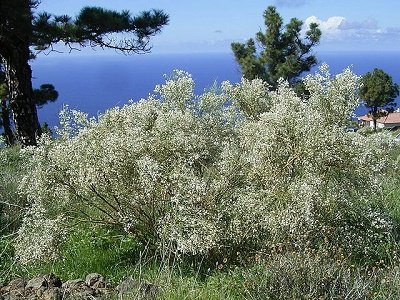
Ramos Sucre: Nevertheless, solitude can be incarnated as a superior will in the face of that destiny, and strengthen the interiority and also keep away the empty habits that sterilize the spirit.
**Leopardi: I think so. But solitude is also agony for a time and a world not chosen, not deserved. In its asylum sensibility is exacerbated and purified, it becomes a fine and fragile thread, a tormented conscience. The spiritual intensity that informs your being also traces your estrangement from the world, your solitary fate. In the face of ordinary life we are strangers: "impertinent beloved who tells me bitterness", you wrote.
Ramos Sucre: I wanted to bear witness to a world abandoned to evil, and I appreciated it as a generating force of beauty, a preponderant feature in the memory of humanity. However, I revolted against my own suffering and that of my fellow men. I longed to escape from the adversity that gnawed at my spirit and fatigued me. Unhappiness had riven my life and was lodged like a mole in my body.
**Leopardi: The affinity of our lives amazes me. My suffering, that which I observed in my time and that which I knew of other times through study, encouraged in me a desperate philosophy. In it I came to think, although I was torn in doing so, that unhappiness is innate to the human race.
Ramos Sucre: But is it not possible to achieve individual serenity in the face of a state of suffering?
**Leopardi: Serenity will always be a state to come, even in the most secluded isolation. But contemplation and imagination allow you to unveil the unseen, the sensed, the undefined of existence and of things. And in that feeling an intuition, like an inner look, sustains you: the eternal.
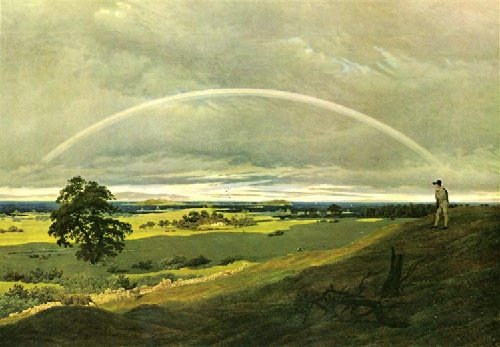
Fuente | Source - Dominio público | Public Domain
Ramos Sucre: Or the infinite, as you called it and about which you wrote: "thus, in this immensity, my thought sinks / and shipwreck is sweet to me in this sea". Also in my books I shared that feeling: "...and an infinite solace will rest my countenance". The search for the absolute, the presence of mystery, visited my spirit and kept it in suspense. Finding no answer in the present, my soul let itself be inhabited by a past time, mythical, archetypal, where the distant acted as a reverie, a transcendence, an escape from the world.
**Leopardi: This was one of my vital concerns: how to make the infinite a present presence? I found the answer in memory (and its oblivion) and in imagination. Thanks to them the soul can experience an open sensation, conceive an indeterminate time, think blurred spaces close to innocence and enigma. But to touch this depth involves a challenge to the word.
Ramos Sucre: Yes, the sharpness and density of such a vision implies the difficulty of its expression. The word debates between the possibility or the impossibility of communicating the eternal with clarity. "I wanted to speak and my words flew through the air...", I remember writing. The ungraspable and the unspeakable, like uncertainty, are laws of the universe. That is why ambiguity is the way to restore to the poetic its quality of sacred word.
**Leopardi: Certainly. The poetic, as a word of the sacred, is an approach to the infinite or to its illusion. And therefore an interpretation of nothingness. For the feeling of the infinite leads to the feeling of one's own decadence and that of what surrounds you: a feeling of death.
Ramos Sucre: In truth, we have crossed the threshold of the absolute and of death.

Referencias | Referencias:
Ramos Sucre, José Antonio (1980). Obra completa. Caracas: Biblioteca Ayacucho.
Leopardi, Giacomo (1939). Diálogos. Buenos Aires: Edit. Espasa-Calpe.
Trizas de Papel nº 5 – Nov. 1990. Cumaná: Centro de Actividades Literarias José Antonio Ramos Sucre.
***
He publicado varios ensayos y textos creativos relacionados con Ramos Sucre, tanto en Steemit con en Hive. Aquí les dejo dos: | I have published several essays and creative texts related to Ramos Sucre, both in Steemit and Hive. Here are two of them: *, **.
***
Puede acceder a la obra completa en español de José Antonio Ramos Sucre en formato pdf por este enlace.
You can access a selection of José Antonio Ramos Sucre's works in pdf format through this link.
Aquí el poema "La retama o la flor del desierto" de Leopardi en español.

Gracias por su lectura | Thank you for reading.



https://twitter.com/jorma08/status/1534976658364678162
The rewards earned on this comment will go directly to the people(@josemalavem) sharing the post on Twitter as long as they are registered with @poshtoken. Sign up at https://hiveposh.com.
Gracias por revivir la memoria de José Antonio Ramos Sucre.
Felicitaciones!
Gracias a usted por leer mi post y escribir este sucinto pero valioso comentario. Ramos Sucre siempre estará presente en mí. Saludos, @hiramdo.
Lo felicito por ese diálogo imaginario entre los dos grandes poetas.
Agradezco tu visita y tu apreciación de mi texto. Saludos, @beaescribe.
Disfruté mucho su trabajo creativo, soy también asiduo lector de la obra del poeta Ramos Sucre, a quién con frecuencia releo, paté de mi formación como poeta está inspirada en su cosmovisión, con respecto a Leopardi aún no lo he leído, por lo que hurgaré en la web, acabo de terminar de leer un trabajo de investigación (Tesis UCAB - Marco Triggiano titulada: La poesía y el suicidio en Venezuela, la obra explora la vida de algunos de los 14 poetas venezolanos entre el siglo 19 y 20 que han muerto por mano propia, la obra también centra su atención en la obra de la poeta peruana - venezolana Martha Kornblith , otra de los poetas suicidas, al punto que desmenuzan sus poemas encontrado el autor pruebas indiciales que apuntan al suicidio planificado, también se exploran que poemas fueron escritos en medio de la esquizofrenia que padecía la autora y cuáles no, también se puede leer unas líneas interesantes sobre Ramos Sucre, gracias por compartir contenido tan valioso. Saludos
PD. Si no ha leído el trabajo de investigación al que hago referencia hágamelo saber para hacerlo llegar.
Gracias por leer mi texto y por tus palabras, @jakim7. Conozco la investigación de Miguel Marcotrigiano (tengo el libro impreso); es un excelente trabajo.También la obra poética de Martha Kornblith, a quien conocí. Hace unas semanas, a propósito del 25 aniversario de su muerte, publiqué un post. Te dejo el enlace: https://peakd.com/hive-179291/@josemalavem/esa-presencia-ausente-a-la-memoria-de-la-poeta-martha-kornblith
Saludos.